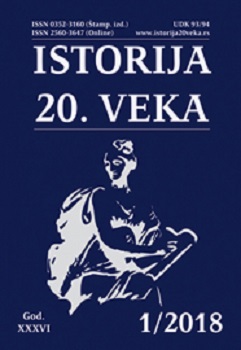Doprinos konferencije u Lusaki 1970. institucionalizaciji saradnje nesvrstanih zemalja i njihovom reaktiviranju u međunarodnim odnosima
Contribution of the Conference in Lusaka 1970 to the Institutionalization of Cooperation of Non-Aligned Countries and their Reactivation in International Relations
Author(s): Dragan BogetićSubject(s): Diplomatic history, Political history, International relations/trade
Published by: Institut za savremenu istoriju, Beograd
Keywords: blocks; non-aligned countries; Yugoslavia; Zambia; Tito; decolonization; coordination; cooperation; Middle East; Far East
Summary/Abstract: During the 70-ies of the last century, non-aligned countries were undertaking initiatives for the formation of a wide movement. This movement was needed to provide conditions for their continuous and coordinated joint actions in international relations. The turning point in this context was the summit in Lusaka (capital of Zambia). There, for the first time, an agreement was finally reached on the measures that would result in the formation of the Non-Aligned Movement and that would contribute to strengthening the role of non-aligned countries in the United Nations and in the wider sphere of international relations. The countries that participated in the conference in Lusaka agreed that the Non-Aligned Movement must not assume the characteristics of a „third block“. It was supposed to represent a broad and open organization, devoid of any new centers of power and hierarchical organization. Hence, they rejected the suggestions of a group of non-aligned countries to form and solidify the Permanent Secretariat body, in which a decisive role would be played by the host country and a narrower group of the politically most exposed countries. After the conference in Lusaka came a period which was often referred to as the „golden age“ of non-alignment. This name seems appropriate, because this was a time of a sudden branching of institutional mechanisms of cooperation of Non-Aligned Countries and their increasingly widespread and powerful joint participation in international relations.
Journal: Istorija 20. veka
- Issue Year: 2018
- Issue No: 1
- Page Range: 161-178
- Page Count: 18
- Language: Serbian

